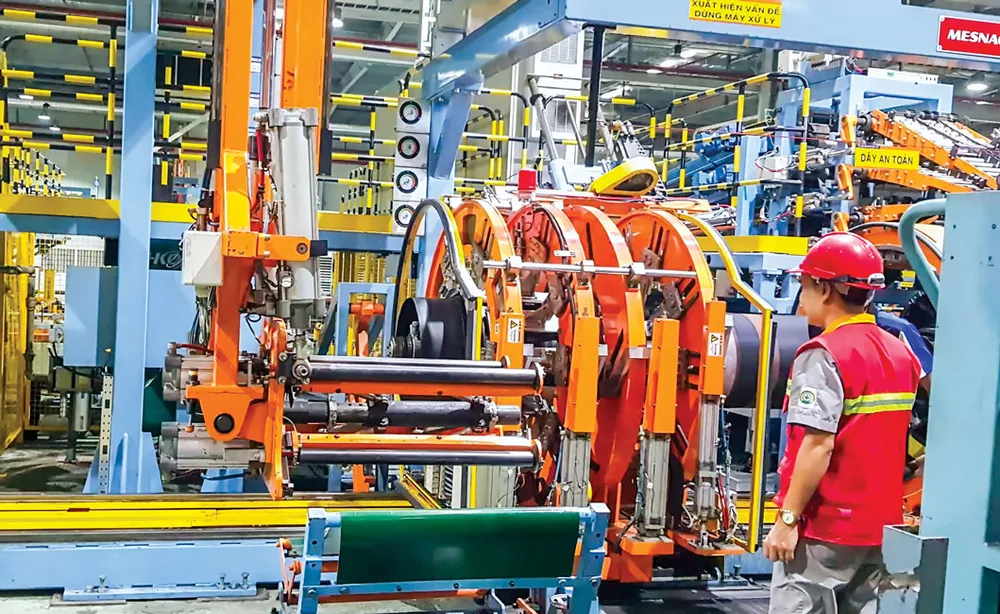
Ease in tax policy is a short-term solution, but now it is vital to make long-term plans to ensure sustainable economic growth as it is becoming increasingly evident that the pandemic could possibly continue for a long time, before it is successfully and finally contained.
Delay in relief policies
Over the past four waves of the pandemic, people and companies have laid their trust in government policies to provide them with adequate support to survive these difficult times. However, so far many of these policies have failed to provide the right support for the right individuals and businesses, with some policies offering assistance far too late.
Statistics show that only 22% of the VND 62,000 bn support package for affected people and institutions in the pandemic last year was distributed to concerned people and organizations. The loan packages for companies to pay their employees did not even reach many companies. These packages were very important because they were intended to directly enable the companies to ride the wave and indirectly help workers survive the hard times and continue to stay on in their jobs in companies.
Figures reported to the National Assembly indicate that the VND 16,000 bn loan package for employers to pay out-of-work employees reached 245 employers who had taken the loans worth VND 41.8 bn to pay 11,276 employees. This is just 0.26% of the support loan package. Another package of VND 6,500 bn reached only 192,503 employees from 1,846 employers, receiving just over VND 786 bn, which is 12.1% of the relief package.
Statistics show that the previous three waves of the Covid-19 pandemic saw upto 98% of companies in trouble and in danger of going bankrupt, but only 2% of the companies received support from relief policies. This time, the Government is trying to avoid making the same previous mistakes. The Minister of Labor, Invalids and Social Affairs told the media that cash will reach the affected people in three-week time. However, the people and companies are still concerned because they will probably have to complete several complex procedures before they can even see the cash.
Ineffective tax policies
Support for the people and companies is not simply for development, but it is part of a solution to provide relief, with the tax relief policy playing a key role. There seems to exist a paradox in the tax relief policy. One report on tax collection activities of tax agencies draws special attention. The taxation sector has collected large amounts, even more than expected, during hard times like these. This seems quite strange. We may have to look closely at the facts leading to it. It is high time we feel unhappy about this paradox, or even consider it a macro-economic risk in the long run.
In the current situation of the Covid-19 pandemic, it would be more reasonable to see smaller amounts of collected taxes and larger amounts of expenditures. When the Government provides support and reduces tax on electricity, water, house rent and other services, the revenue will show less than usual, and that would be absolutely acceptable. On the other hand, greater expenditure to some extent would indicate that relief packages are being distributed to the affected people and institutions as planned. We may have been talking about tightening the budget. This implies reducing public spending, putting off some investment projects and concentrating all resources and efforts on fighting the disease and helping companies with loans and other kinds of assistance.
The analysis above on reports from the tax agencies over the last few months show that tax policies have been rather impractical and ineffective. Competent agencies have not dared to accept fiscal deficit, have not dared to allow tax relaxation, in their effort to consistently provide assistance for affected people and businesses.
Basically, taxes are collected from companies and people rather than created by the tax sector. This is why it is essential to relax taxes, with some taxes being exempted, reduced or deferred, so that the people and businesses can survive these hard times under the pandemic and return to a new normal life of existence. If the tax policy is tightened, it does not provide essential assistance for the people and companies in trouble. When the companies go belly up, there will be nothing left for the national economy which will pose a grave risk for national budget expenditure in the long run.
It is high time that the tax relief policies were made practical and effective. They should be long-sighted, aimed at implementing long-term plans with positive effects on the entire community, rather than remaining short-sighted. If the tax sector and the Ministry of Finance do not actively and promptly introduce policies on tax relaxation now, the Government must take action immediately to urge them to do so.
Now with the next meeting of the National Assembly drawing close, all members of the National Assembly should proactively raise this question in an opinion poll and request the Government to implement the same. The Covid-19 pandemic in all likelihood is here to stay for a very long time and many developed countries have even come to the conclusion that they must now accept it as part of their daily lives.
For this reason alone, by delaying, the implementation of a sustainable public policy could lead to further catastrophic bankruptcy in companies. During hard times, the Government needs to introduce appropriate policies to cover both long-term economic benefits, as well as ensure food security for all the people.




















